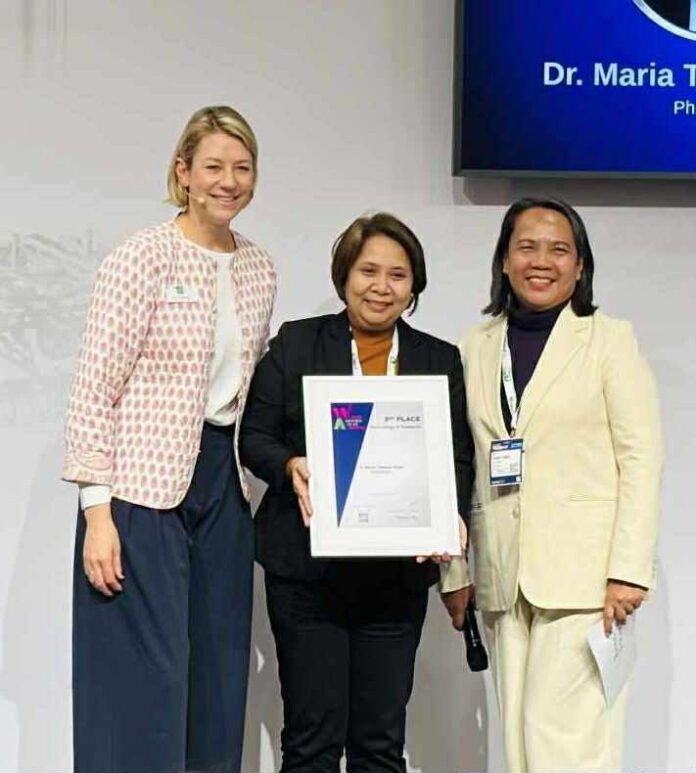“Mother of the Maliputo and Tawilis”—the title sounds part local legend, part scientific street cred, and entirely earned by Dr. Maria Theresa Mutia, the Filipina fisheries expert whose work has safeguarded two of Taal Lake’s most precious species.
When she received the 2025 Women in Ag Award in Hanover, Germany, Dr. Mutia didn’t just step up to accept a medal; she stepped up representing a lake, a volcano, and decades of science-driven devotion.
Long before international judges took notice, Dr. Mutia was busy solving a puzzle that had baffled researchers for years: how to convince the famously temperamental maliputo (Caranx ignobilis) to reproduce in captivity. This high-value fish had a reputation for being uncooperative—an aquatic diva that refused to follow directions no matter how carefully researchers calibrated tanks or conditions.
With meticulous research and the kind of patience that only long nights in hatcheries can build, she achieved the first successful captive breeding of maliputo. The breakthrough didn’t just prove a scientific point; it established a reliable hatchery system that eased pressure on wild stocks and provided fresh livelihood opportunities for fisherfolk who depend on the lake.
While maliputo tested her technical chops, the endangered tawilis—the world’s only freshwater sardine—tested her protective instincts. Endemic to Lake Taal and prone to pressure from overfishing, water quality changes, and the lake’s volcanic temperament, the tawilis needed urgent intervention. Rather than simply documenting its decline, Dr. Mutia set out to reverse it.
Her studies on tawilis biology and population trends informed policies that reshaped fisheries management. The annual March–April closed season grew directly from her findings. So did the creation of reserve areas within Lake Taal. These measures gave the species long-overdue breathing room—a rare conservation win for a fish whose entire existence depends on a single, temperamental lake.
Her path to international recognition began quietly in 1992 when she joined the Department of Agriculture–National Fisheries Research and Development Institute (NFRDI) as a contractual biologist. What she lacked in job security, she made up for in determination. Armed with a Bachelor of Science in Zoology and later a Master of Science and Doctor of Philosophy in Environmental Science from the University of the Philippines Los Baños, she steadily built a career grounded in evidence, consistency, and sheer grit.
After 33 years in government service, she now leads the NFRDI as its executive director—an achievement built on persistence, passion, and a belief that science should meaningfully reach the people it serves.
A leader grounded in collaboration, care, despite the global spotlight, Dr. Mutia remains characteristically humble. In her acceptance speech, she emphasized the collective nature of progress, saying: “This recognition is not mine alone, but a reflection of the collective efforts of the many people I have had the privilege to meet, work with, and learn from.” Her words echoed what her career has embodied: science is collaborative, and its impact is magnified when shared.
Her win is also historic. She is the first Filipina to receive recognition in the Women in Ag Award’s Technology and Research category. With honorees from Austria, Spain, Thailand, and two fellow Filipinas celebrated in the Education category, she helped spotlight a growing truth: women are driving the future of agriculture, fisheries, and environmental stewardship.
Yet what makes Dr. Mutia unforgettable is the unique blend of rigor and compassion she brings to her work. She didn’t simply study maliputo; she secured its future. She didn’t just research tawilis; she helped protect it through policy grounded in sound science. She continues to mentor young scientists, support fisherfolk, and advocate for ecosystems shaped by both natural wonder and natural volatility.
In a world where species often vanish quietly, Dr. Maria Theresa Mutia ensured that two did not. Her monicker wasn’t crafted in a meeting room—it emerged naturally from decades of stewardship, persistence, and deep care for the waters of Taal.







